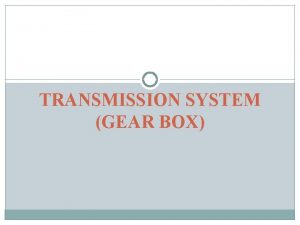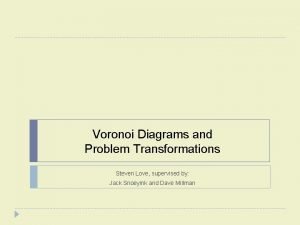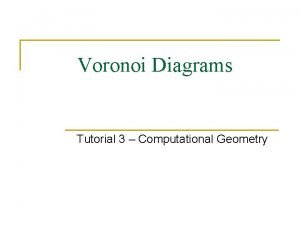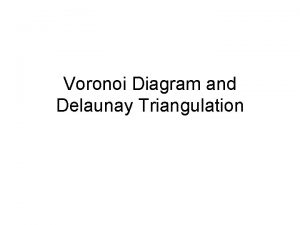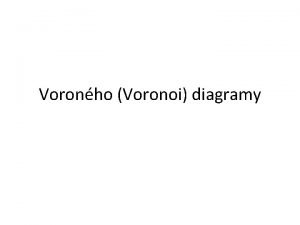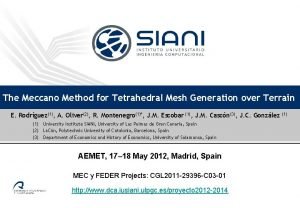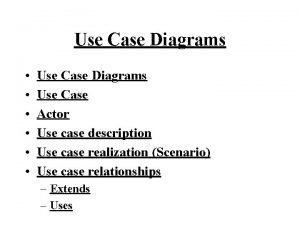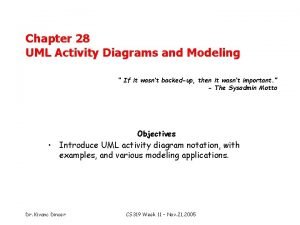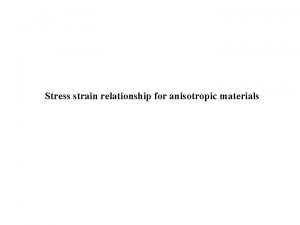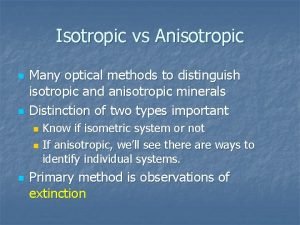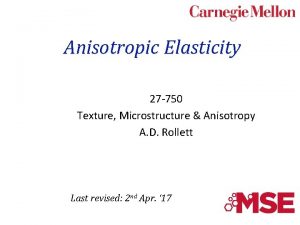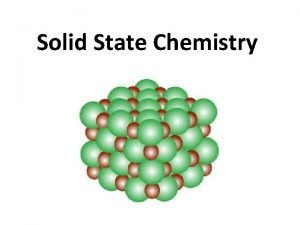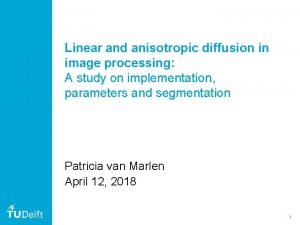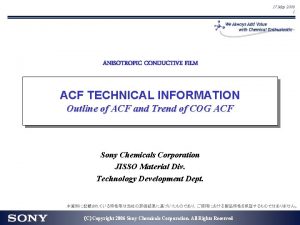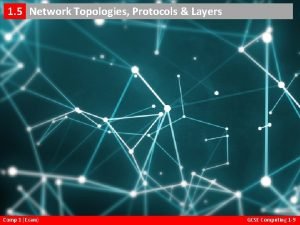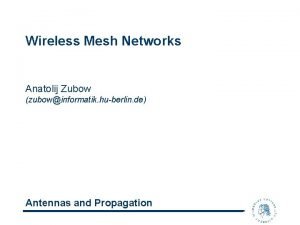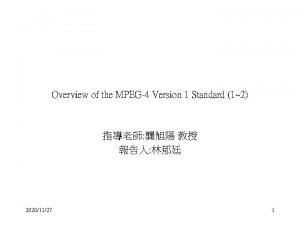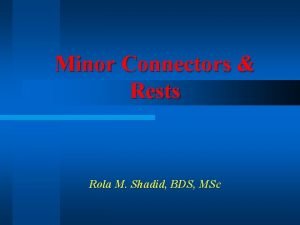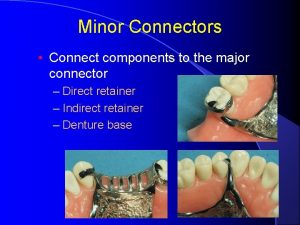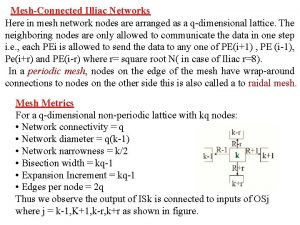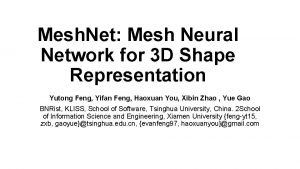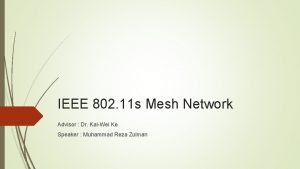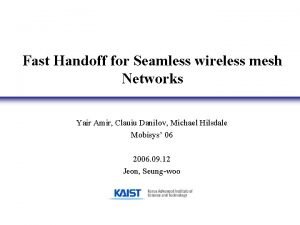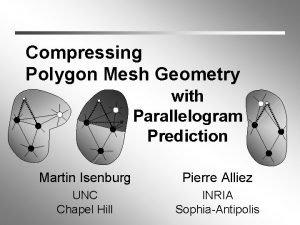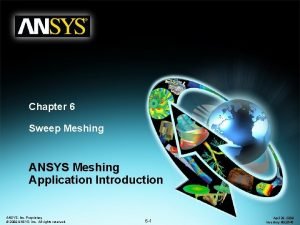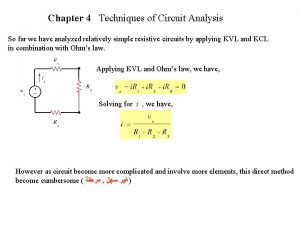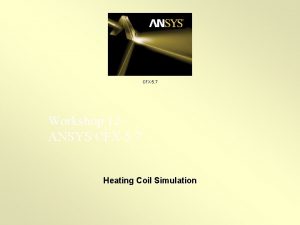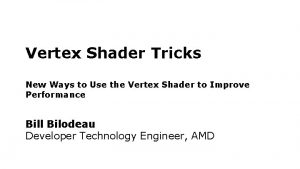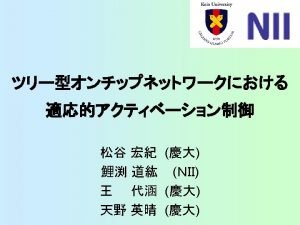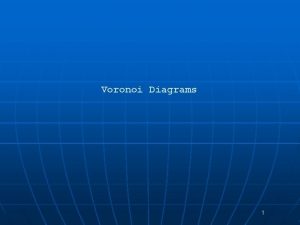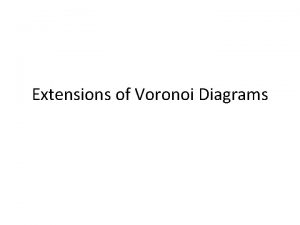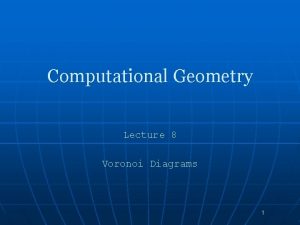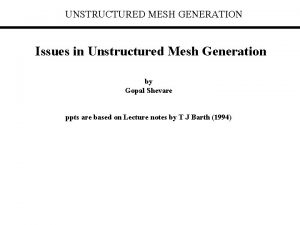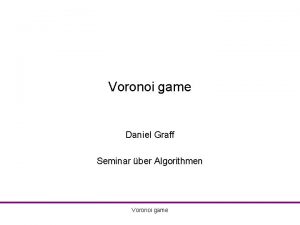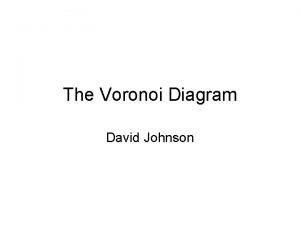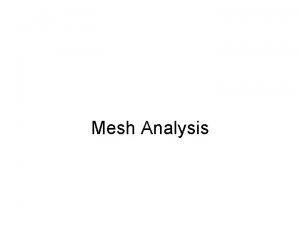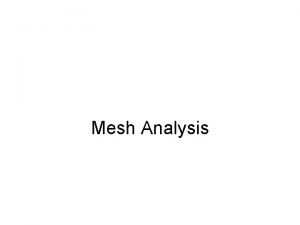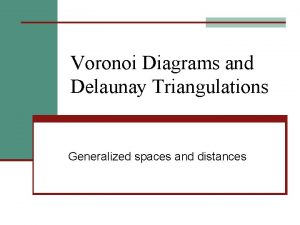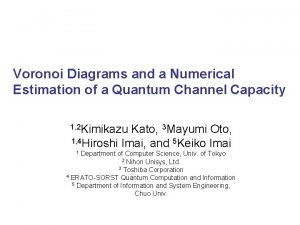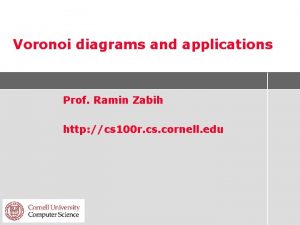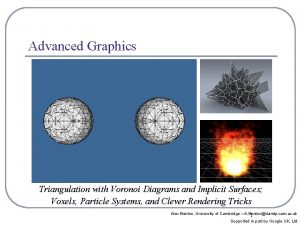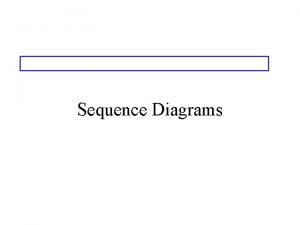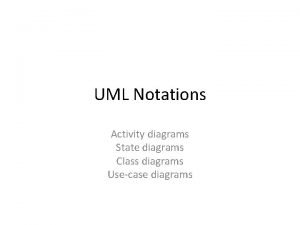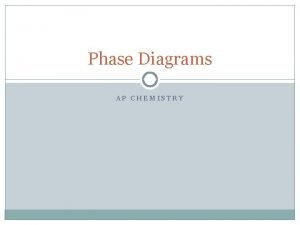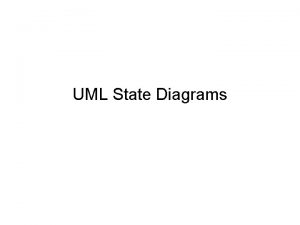Anisotropic Voronoi Diagrams and GuaranteedQuality Anisotropic Mesh Generation








![Heuristic Algorithms for Generating Anisotropic Meshes George-Borouchaki [1998] Bossen-Heckbert [1996] Shimada-Yamada-Itoh [1997] Li-Teng-Üngör [1999] Heuristic Algorithms for Generating Anisotropic Meshes George-Borouchaki [1998] Bossen-Heckbert [1996] Shimada-Yamada-Itoh [1997] Li-Teng-Üngör [1999]](https://slidetodoc.com/presentation_image_h2/ac0b49a584ec5d63f19e7f6ceb12dac0/image-9.jpg)




![Distance Function Examples 3. Anisotropic Voronoi diagram dv(p) = [(p – v)TMv(p – v)]1/2 Distance Function Examples 3. Anisotropic Voronoi diagram dv(p) = [(p – v)TMv(p – v)]1/2](https://slidetodoc.com/presentation_image_h2/ac0b49a584ec5d63f19e7f6ceb12dac0/image-14.jpg)






























- Slides: 44

Anisotropic Voronoi Diagrams and Guaranteed-Quality Anisotropic Mesh Generation François Labelle Jonathan Richard Shewchuk Computer Science Division University of California at Berkeley, California Presented by Jessica Schoen

Outline Anisotropic meshes Anisotropic Voronoi diagrams Algorithm for anisotropic mesh generation Current research

I. Anisotropic Meshes

What Are Anisotropic Meshes? Meshes with long, skinny triangles (in the right places). Why are they important? • Often provide better interpolation of multivariate functions with fewer triangles. • Used in finite element methods to resolve boundary layers and shocks. Source: “Grid Generation by the Delaunay Triangulation, ” Nigel P. Weatherill, 1994.

Distance Measures Metric tensor Mp: distances & angles measured by p. Deformation tensor Fp: maps physical to rectified space. Mp = Fp. T Fp. Fp Physical Space p q Fq Fq. Fp-1 p Fp. Fq-1 q

Distance Measures Metric tensor Mp: distances & angles measured by p. Deformation tensor Fp: maps physical to rectified space. Mp = Fp. T Fp. Fp Physical Space p q Fq Fq. Fp-1 p Fp. Fq-1 q Every point wants to be in a “nice” triangle in rectified space.

The Anisotropic Mesh Generation Problem Given polygonal domain and metric tensor field M, generate anisotropic mesh.

A Hard Problem (Especially in Theory) Common approaches to guaranteed-quality mesh generation do not adapt well to anisotropy. • Quadtree-based methods can be adapted to horizontal and vertical stretching, but not to diagonal stretching. • Delaunay triangulations lose their global optimality properties when adapted to anisotropy. No “empty circumellipse” property.
![Heuristic Algorithms for Generating Anisotropic Meshes GeorgeBorouchaki 1998 BossenHeckbert 1996 ShimadaYamadaItoh 1997 LiTengÜngör 1999 Heuristic Algorithms for Generating Anisotropic Meshes George-Borouchaki [1998] Bossen-Heckbert [1996] Shimada-Yamada-Itoh [1997] Li-Teng-Üngör [1999]](https://slidetodoc.com/presentation_image_h2/ac0b49a584ec5d63f19e7f6ceb12dac0/image-9.jpg)
Heuristic Algorithms for Generating Anisotropic Meshes George-Borouchaki [1998] Bossen-Heckbert [1996] Shimada-Yamada-Itoh [1997] Li-Teng-Üngör [1999]

II. Anisotropic Voronoi Diagrams

Voronoi Diagram: Definition Given a set V of sites in Ed, decompose Ed into cells. The cell Vor(v) is the set of points “closer” to v than to any other site in V. Mathematically: Vor(v) = {p in Ed: dv(p)≤ dw(p) for every w in V. } distance from v to p as measured by v

Distance Function Examples 1. Standard Voronoi diagram dv(p) = || p – v ||2

Distance Function Examples 2. Multiplicatively weighted Voronoi diagram dv(p) = cv|| p – v ||2
![Distance Function Examples 3 Anisotropic Voronoi diagram dvp p vTMvp v12 Distance Function Examples 3. Anisotropic Voronoi diagram dv(p) = [(p – v)TMv(p – v)]1/2](https://slidetodoc.com/presentation_image_h2/ac0b49a584ec5d63f19e7f6ceb12dac0/image-14.jpg)
Distance Function Examples 3. Anisotropic Voronoi diagram dv(p) = [(p – v)TMv(p – v)]1/2

Anisotropic Voronoi Diagram

Duality

Two Sites Define a Wedge


Dual Triangulation Theorem

III. Anisotropic Mesh Generation by Voronoi Refinement

Easy Case: M = constant

Easy Case: M = constant


Voronoi Refinement Algorithm

Voronoi Refinement Algorithm Islands Insert new sites on unwedged portions of arcs.

Voronoi Refinement Algorithm Orphan Insert new sites on unwedged portions of arcs.


Voronoi Refinement Algorithm

Encroachment

Special Rules for the Boundary

Special Rules for the Boundary

Main Result

Why Does It Work?

Why Does It Work?

Numerical Problem Red Voronoi vertex is intersection of conic sections

Numerical Problem Intersection is computed numerically ?

Numerical Problem Which side of the red line is the vertex on? ?

Numerical Problem Which side of the red line is the vertex on? Geometric predicates are not always truthful and the program crashes. ?

IV. My Current Research

Star of a Vertex: Definition The star of a vertex v is the set of all simplices having v for a face.

Star Based Anisotropic Meshing Each vertex computes its own star independently

Inconsistent Stars If the arcs and vertices of the corresponding anisotropic Voronoi diagram are not all wedged, the diagram may not dualize to a triangulation, and the independently constructed stars may not form a consistent triangulation.

Equivalence Theorem If the arcs and vertices of the anisotropic Voronoi diagram are all wedged, then v the independently constructed star of v v contains the same sites as star(v) in the dual of the anisotropic Voronoi diagram.

 Sliding mesh gear system
Sliding mesh gear system Toxic waste dump problem voronoi
Toxic waste dump problem voronoi Voronoi diagram tutorial
Voronoi diagram tutorial Delaunay triangulation divide and conquer algorithm
Delaunay triangulation divide and conquer algorithm Voroneho diagram
Voroneho diagram Voronoi cella
Voronoi cella Mesh generation
Mesh generation Use case model
Use case model Activity diagrams are static diagrams
Activity diagrams are static diagrams First generation antipsychotics
First generation antipsychotics You are good and your mercy endureth forever
You are good and your mercy endureth forever Stress strain relationship matrix
Stress strain relationship matrix Isotropic vs anisotropic etching
Isotropic vs anisotropic etching Isotropic vs anisotropic minerals
Isotropic vs anisotropic minerals Oxide etcher
Oxide etcher Anisotropic properties
Anisotropic properties Anisotropic meaning in chemistry
Anisotropic meaning in chemistry Anisotropic diffusion in image processing
Anisotropic diffusion in image processing Anisotropic conductive film
Anisotropic conductive film 3m anisotropic conductive film adhesive 5363
3m anisotropic conductive film adhesive 5363 Mesh topology diagram
Mesh topology diagram Sky q mesh network diagram
Sky q mesh network diagram Service mesh architecture infrastructure layer
Service mesh architecture infrastructure layer Fem mesh
Fem mesh Mpeg-4 mesh animation
Mpeg-4 mesh animation Maesh service mesh
Maesh service mesh Cingulum rest canine
Cingulum rest canine Lattice type minor connector
Lattice type minor connector Mesh connected illiac network
Mesh connected illiac network Arrow mesh wifi
Arrow mesh wifi Meshnet: mesh neural network for 3d shape representation
Meshnet: mesh neural network for 3d shape representation 11s mesh solutions
11s mesh solutions Mesh wifi handoff
Mesh wifi handoff Staggered parallelogram mesh
Staggered parallelogram mesh Ansys sweep mesh
Ansys sweep mesh Inflation in meshing
Inflation in meshing Non planar circuit
Non planar circuit How to save mesh file in ansys workbench
How to save mesh file in ansys workbench Air 4920 boligpakke
Air 4920 boligpakke Planet mesh
Planet mesh Hlsl
Hlsl Topologjia star
Topologjia star Raw mesh
Raw mesh Outdoor wireless mesh network design
Outdoor wireless mesh network design Meshcnn: a network with an edge
Meshcnn: a network with an edge
